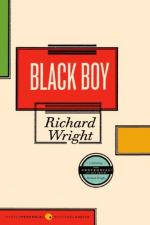|
|
Black Boy Topic Tracking: Violence
Chapters 1-5
Violence 1: His mother beats him until he nearly dies. He begins the story with that beating, which sets the scene for the violence all around him. He views violence as a way of life, from the moment he is born until the end of the story.
Violence 2: Throughout his childhood, his father is nothing to him but the threat of punishment. They have no kind of friendly relationship; respect is won through blows, at times given precisely because they are not deserved. He thinks of his father as the man he has to be quiet for (because his father sleeps during the day.)
Violence 3: In his father's tradition, is grandmother casually slaps him throughout the book. He is taught not to resist these slaps, but to rather welcome them as an indication that he has done something wrong.
Violence 4: At school, he must fight to be accepted. He cannot try to make friends until he has shown himself to be a force to be reckoned with. This is accomplished by the typical knocking-the-hat-off-the-new-boy's-head-to-see-if-he-will-fight ritual.
Violence 5: His Aunt Addie, in the tradition of his grandmother, beats him because she cannot admit she is wrong. Richard continually meets people who feel they can abuse him for whatever reason they can come up with. Addie sees him as a threat to her authority, so she beats him.
Chapters 6-10
Violence 6: His Uncle Tom tries to beat him to discipline him, but Richard pulls a razor blade on him. When Richard fights back, he shows Tom that he cannot be intimidated, that he is reckless and dangerous and therefore powerful. Tom is very angry, but also respectful. This is one of the first times Richard uses violence against others.
Violence 7: He is repeatedly threatened and injured by whites. Some, like those he works for in the clothing store, are merely haphazardly threatening. Others, like Mr. Olin at the optical company, seem bent on orchestrating Richard's demise. Mr Olin even tries to get Richard and another young man, Harrison, to kill each other, simply for his own sport.
Chapters 11-15
Violence 8: He and Harrison humiliate themselves by fighting for money. They try to make some money by putting on a show, but are unable to fake a fight and so are forced to actually injure each other out of fear of white people and desire for a new suit. Richard feels deeply ashamed.
Chapters 16-20
Violence 9: When Richard moves to Chicago and joins the Communist group, he learns how frequently he police beat protesting Communists. Richard seems to move from one outcast group to another, never escaping the threat of those in charge. He never feels completely safe.
Violence 10: At the end of the book, Wright is forcefully thrown from the ranks marching Communists during a parade. Even though they espouse peace, they fear Richard so much that they feel justified in injuring him in public. The incident paralells many others in Richard's life, most obviously that of Granny's "religiously sanctioned" violence against Richard.




